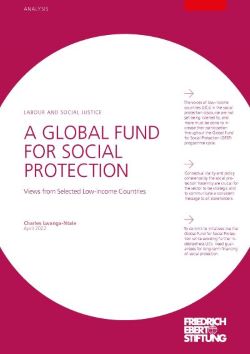 |
The study on low-income countries’ (LICs) views of the proposed Global Fund for Social Protection (GFSP) sought to contribute to discussions on the operational dimensions of the fund, adding to existing knowledge on the available financial and administrative options. Findings from this study point us to several broad areas of interest, including the political economy, systems and structures, technical and financial capacity to implement, and accountability.
The voices of low-income countries (LICs) in the social protection discourse are not yet being listened to, and more must be done to increase their participation throughout the Global Fund for Social Protection (GFSP) programme cycle.
Conceptual clarity and policy coherence by the social protection fraternity are crucial for the sector to be strategic and to communicate a consistent message to all stakeholders.
To commit to initiatives like the Global Fund for Social Protection while avoiding further indebtedness LICs need guarantees for long-term financing of social protection.
The primary objective of the study is to give LICs more of a voice in the debate on the establishment of the GFSP, by accessing better and more recent evidence of LIC views, in light of the fact that these may differ from those of middle-income countries. Specifically, the study seeks to establish the extent to which LIC governments prioritise publicly funded SP and how this reflects the priorities of their populations; whether funding is predictable and long term; the concerns that governments have regarding autonomy; interest in technical cooperation on SP strategies; etc.
The picture that emerges from this study is one of cautious optimism for the future of SP in LICs, and specifically for the anticipated global fund. There is enthusiasm that SP, a key item on the sustainable development agenda, is not only beginning to be incorporated in the mainstream development agenda but is also in the process of finding a potential facilitator and driver with an independent and focused remit. The establishment of the fund would demonstrate recognition that the scale and complexity of poverty, risk and vulnerability cannot be left to old-style poverty eradication approaches adopted by individual countries. A challenge of such magnitude cannot be successfully addressed by single actors, as this requires a variety of tools, models, and experiences. Thus, the representation and participation of LICs in moving forward with this agenda is extremely crucial.
Labour and Social Justice. A GLOBAL FUND FOR SOCIAL PROTECTION
Views from Selected Low-income Countries. By Charles Lwanga-Ntale. April 2022